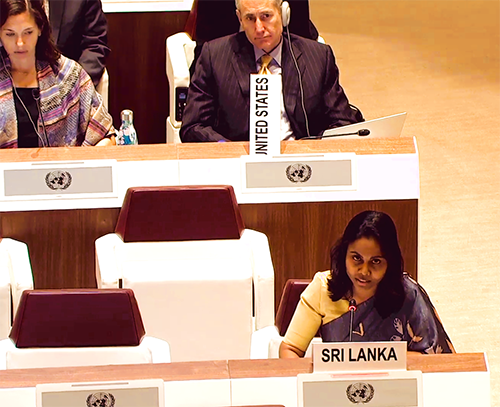2023 Meeting of High Contracting Parties to the Convention on Prohibitions or Restrictions on the Use of Certain Conventional Weapons Which May be Deemed to Be Excessively Injurious or to Have Indiscriminate Effects (CCW), 15-17 November 2023

2023 Meeting of High Contracting Parties to the Convention on Prohibitions or Restrictions on the Use of Certain Conventional Weapons Which May be Deemed to Be Excessively Injurious or to Have Indiscriminate Effects (CCW)
Statement by Sri Lanka, 16 November 2023
Mr. President,
We take this opportunity to congratulate you on the assumption of the Presidency of the 2023 Meeting of High Contracting Parties to the Convention on Certain Conventional Weapons. We also thank the ISU of CCW for facilitating the meeting and the process of implementation of the Convention.
We are confident that this meeting of High Contracting Parties will lead to constructive discussions and substantive outcome will further strengthen the universal implementation and adherence to the Convention by all parties to end devastative use of arms and their destructive impact, in order to ensure the wellbeing of entire human kind.
Sri Lanka continues to express its serious concerns at the unprecedented loss of life and suffering of the people of Palestine causing a grave humanitarian situation due to the escalation of violence and military action in Gaza. We condemn the use of explosive weapons in densely populated areas affecting civilians and civilian infrastructure. Sri Lanka also condemns terrorism in all its forms, including by all those who resort to violence to achieve their goals whether political or otherwise.
Sri Lanka supports the urgent call of the UN Secretary General and UNGA for an immediate ceasefire and for the establishment of a humanitarian corridor to provide unimpeded access for humanitarian aid including supplies of food, water, medicine, fuel and electricity as well as access to aid workers into the besieged areas.
At this critical juncture where the escalation of violent acts is witnessed in many parts of the world, we believe and recognize the CCW framework as an important component of multilateral disarmament, to develop international law to ‘ban or restrict the use of specific types of weapons that are considered to cause unnecessary or unjustifiable suffering to combatants or to affect civilians indiscriminately in armed conflicts of international and non-international nature’. Therefore, we believe that a vital responsibility lies in the hands of High Contracting Parties to assess the emerging sophisticated High-Tec warfare technologies and bring international community to a consensually agreed mechanism to address the related issues.
Sri Lanka is deeply concerned of the legal, ethical and moral consequences of the high potential weapon systems that have no human control. At this important forum we wish to re-iterate Sri Lanka’s consistent position of supporting and promoting negotiation of a legally binding instrument on lethal and autonomous weapons systems. We strongly believe that the mandate of the Group of Government Experts (GGE) on Lethal and Autonomous Weapons (LAWS) should be continued with a stronger mandate with forward looking perspective, considering the rapid development of arms technologies and Artificial Intelligence.
We recall that in the New Agenda for Peace, the UN Secretary-General has called for ‘negotiations to be concluded by 2026 on a legally binding instrument to prohibit lethal autonomous weapons systems that function without human control or oversight, and which cannot be used in compliance with international humanitarian law’. We firmly believe that the extensive negotiations and strong interest of member states over the past decade for the need of a legally binding instrument to prohibit and control lethal and autonomous weapons should not be undermined or neglected and should be carried forward in a productive manner to safeguard the peace and security of the entire world.
As one of the main sponsors of the UNGA Resolution on Lethal and Autonomous Weapons Systems which was adopted by an overwhelming majority at the 78th Session of the UNGA, Sri Lanka ‘stresses the urgent need for the international community to address the challenges and concerns raised by autonomous weapons systems, in particular through the Group of Governmental Experts (GGE) on Emerging Technologies in the Area of Lethal Autonomous Weapons Systems (LAWS), and to continue to further its understanding of the issues involved’. In this regard we believe that it is vital to take on board the views of all stakeholders including ‘international and regional organizations, the International Committee of the Red Cross, civil society, the scientific community and industry’.
We appreciate the efforts of the Chair of GGE on LAWS in negotiating a renewed mandate of GGE on LAWS while considering the divergent positions and views of delegations and bringing them to a balanced point. The legal, ethical, moral and technological impact of Lethal Autonomous Weapons needs to be thoroughly evaluated and discussed in all aspects in the context of prevailing challenges, rapid development of technologies including AI, expenditure by countries in warfare etc. from the perspective of International Law, International Humanitarian Law as well as Human Rights Law, in the interest of international peace and security. We hope that the member states would agree by consensus on the renewed mandate of the GGE on LAWS which is vital to carry forward the objective of addressing future issues, emanating from advanced technologies on LAWS.
Mr. President,
I wish to reiterate Sri Lanka’s commitment to working with all member states to achieve a positive and progressive outcome of the Meeting of High Contracting Parties. Sri Lanka wishes to assure you of its fullest support and cooperation for the success of the deliberations.
Thank you
